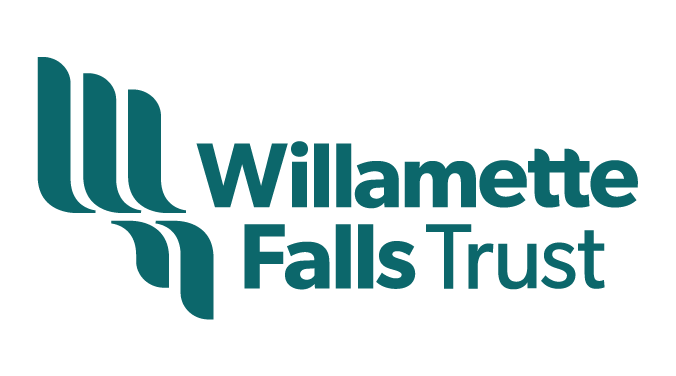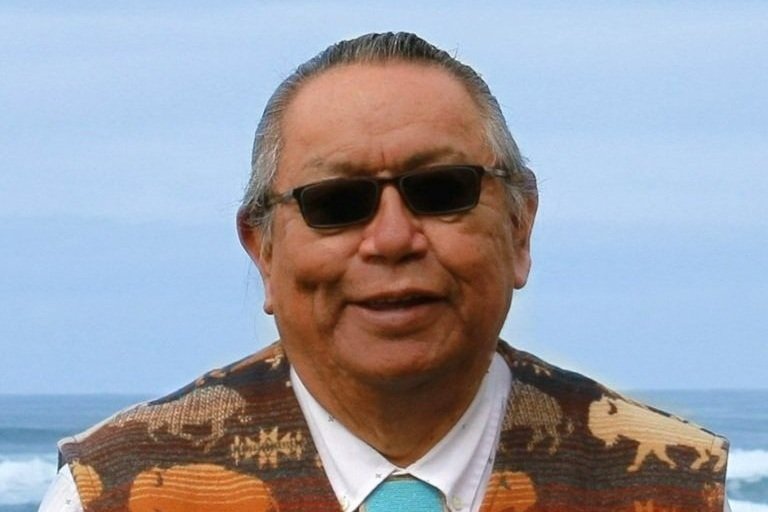Tribal Leadership Spotlights
Willamette Falls is a place that represents Tribal leadership and tells a variety of different Tribes’ stories. In honor of Native American Heritage Month, the Trust has dedicated spotlights to each of our Tribal Leadership Representatives, illustrating the array of diverse backgrounds anchored to this special place.
Robert Kentta
Confederated Tribes of the Siletz Indians
Robert Kentta serves as the Chair of the Board of Directors of Willamette Falls Trust. Widely regarded for his vast knowledge of cultural history in the region and his diplomatic leadership, Kentta served as the Cultural Resources Director for the Confederated Tribes of Siletz Indians for 29 years, and served on Siletz Tribal Council for 18 years. He actively supports Siletz languages, ceremonial and cultural events, cultural and sacred site protection, archeological and archival research, history, and cultural education.
Kentta is a traditional artist who specializes in regalia and basket weaving and mentors Tribal members interested in continuing these traditions and cultural continuity of the Tribe. He grew up in his Tribal community of Siletz, Oregon and attended the Institute of American Indians Arts in Santa Fe, New Mexico.
Jim Manion
Confederated Tribes of the Warm Springs
Jim is an enrolled member of the Confederated Tribes of the Warm Springs (“Warm Springs”) and currently serves on the 29th Tribal Council. Jim also serves as his Tribe’s Columbia River Inter-Tribal Fish Commissioner.
As a tribal member of Wasco descent that grew up on the Warm Springs Reservation, knowledge of traditional tribal culture mixed with contemporary business management skills gives Jim a unique vision for our Willamette Falls Inter-Tribal Public Access Project, where he holds experience in harmonizing projects involving economic development, natural resource utilization, while tying both to cultural preservation.
Jim’s connection to Willamette Falls is rooted in his family and own experiences with fishing and gathering of eels and sacred first foods at the Falls. He recalls stories he was told of his great Grandfather, Jerry Brunoe, harvesting at the Falls and its tributaries; this is where he learned the Falls “is a place we have gathered for harvesting and visiting with other tribes around the region, who also shared the resource to provide sustenance for all people, since time immemorial.”
Jim recently retired after serving his tribe for 41 years as the General Manager of the Tribe’s Power & Water Enterprise, where he managed the operation of the Tribe’s interest in the Pelton Round Butte Hydroelectric Project. Jim was responsible for oversight on energy development activity on the Tribal land base.
Toby Patrick
Confederated Tribes of the Umatilla Indian Reservation
Toby Patrick is an enrolled member of the Confederated Tribes of the Umatilla Indian Reservation (“Umatilla”) and serves on Umatilla’s governing Board of Trustees. Toby previously served 28 years working with Umatilla’s Cultural Resources Department, and currently takes part in the Umatilla Cultural Resource Committee.
In the community, Toby stands as a longhouse leader and a dedicated culture keeper, with a profound connection to Willamette Falls that spans countless generations within his family. Toby vividly recalls his initial journey to fish for the k’suyas, the eel, during his youth, emphasizing the significance of bonding with traditional fishing sites and engaging with other Native families from various Tribes in the region (*). Toby firmly upholds the responsibility of safeguarding these places and the fish relatives, emphasizing their importance for the well-being of the natítayt, or all Indigenous people.
Bringing these valuable perspectives to the Board of Directors, Toby collaborates with fellow Tribal Leaders to lead initiatives aimed at enhancing the Falls and its interconnected communities.
*Note: Happy Canyon princesses Latis Nowland, left, and Susie Blackwolf Patrick (Toby’s Daughter), right, at Willamette Falls where Pacific lamprey were being harvested.
Yakama Nation Willamette Falls Lamprey Celebration, July 13, 2023 (Beth Nakamura/The Oregonian)
Davis Washines
Confederated Tribes and Bands of Yakama Nation





